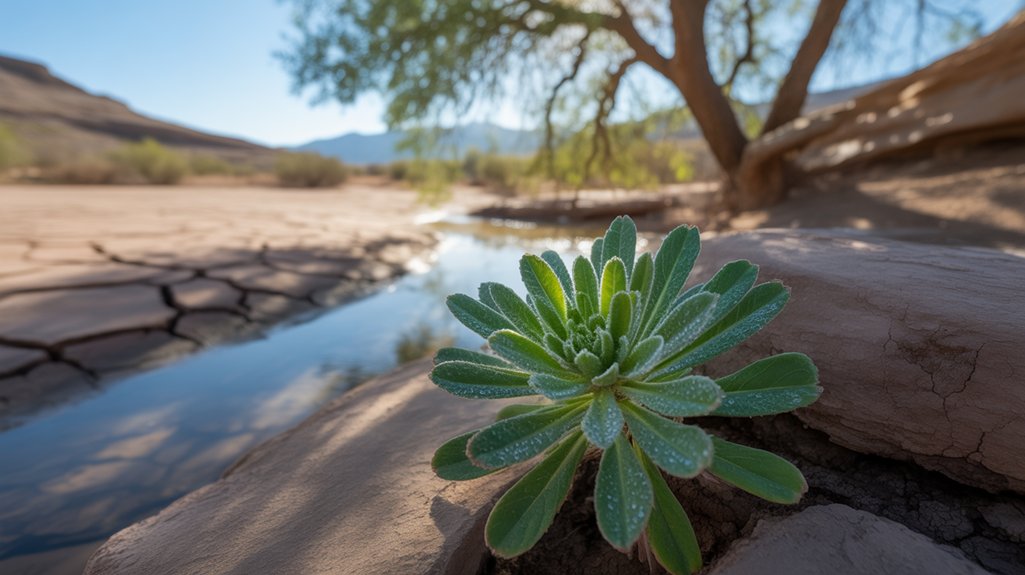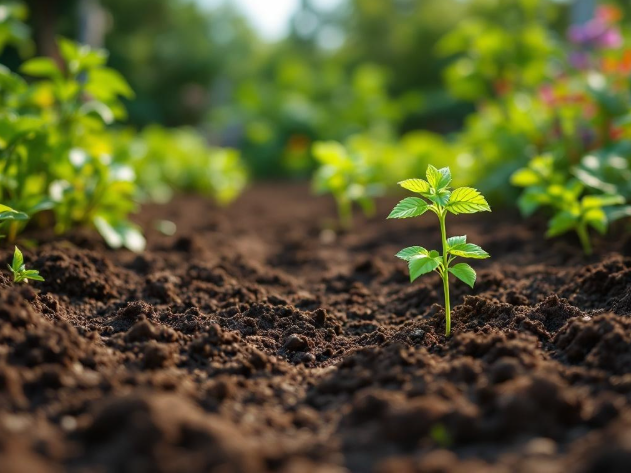Why Plant Health Care Matters in Colorado’s Unique Climate
In Colorado, understanding plant health care in Colorado is crucial for thriving gardens and landscapes. With the state’s diverse ecosystems and unpredictable weather, your plants face unique challenges. By prioritizing soil health and effective water management, you can enhance their resilience. But what about the pests and diseases that threaten their growth? Explore how these factors intertwine to create a sustainable environment that benefits both your garden and the local community.
The Importance of Soil Health in Diverse Ecosystems

Soil health plays a crucial role in maintaining diverse ecosystems, as it directly influences plant growth, water retention, and nutrient cycling for plant health care in Colorado.
When you understand soil composition, you’ll see how the right balance of minerals, organic matter, and microorganisms can enhance plant vitality. Healthy soil supports robust nutrient cycles, allowing plants to absorb essential elements like nitrogen and phosphorus efficiently.
This process not only promotes growth but also helps sustain the entire ecosystem, providing habitats for various organisms. By nurturing your soil, you’re not just benefiting your plants; you’re fostering biodiversity and resilience within your landscape.
Managing Water Resources for Sustainable Growth

Healthy ecosystems thrive on a balanced interplay of resources, with water management being a key factor in promoting sustainable growth for plant health care in Colorado.
You can make a significant impact by implementing effective water conservation strategies and enhancing irrigation efficiency. Here are three essential steps to consider:
- Collect Rainwater: Capture and store rainwater to reduce dependency on municipal sources.
- Use Drip Irrigation: This method delivers water directly to plant roots, minimizing waste and ensuring plants receive what they need.
- Mulch Your Gardens: Mulching retains moisture in the soil, reducing the need for frequent watering.
For more water-saving tips, explore this CSU Extension guide.
Identifying and Combating Common Pests and Diseases
How can you keep your plants thriving amidst the threats posed by pests and diseases? Start with effective pest identification; regularly inspect your plants for signs of trouble, like discolored leaves or unusual spots, as part of plant health care in Colorado.
Familiarize yourself with common pests in Colorado, such as aphids and spider mites, to catch infestations early. Once you identify an issue, implement disease management strategies that fit your plants’ needs. This might include using organic pesticides, promoting beneficial insects, or practicing crop rotation.
Don’t forget the importance of healthy soil and proper watering, as strong plants are less susceptible to pests and diseases. By staying proactive and informed, you can create a resilient garden that flourishes despite challenges.
The Role of Native Plants in Resilient Landscapes
A resilient garden not only combats pests and diseases but also thrives with the right plant choices. By incorporating native plants, you not only beautify your landscape but also support the ecosystem as part of plant health care in Colorado.
Here are three powerful native plant benefits:
- Water Conservation: Native plants require less water, making your garden more sustainable.
- Wildlife Support: They provide essential habitats for local pollinators and wildlife, enhancing biodiversity.
- Soil Health: Native plants improve soil structure and fertility, creating a healthier environment.
Choosing native plants isn’t just about aesthetics; it’s about fostering biodiversity enhancement in your garden.
You’ll create a resilient landscape that flourishes, supports local wildlife, and reduces maintenance efforts. Embrace the power of native plants to ensure your garden thrives in Colorado’s unique climate!
Seasonal Challenges: Preparing for Colorado’s Climate Variability
As you navigate the challenges posed by Colorado’s climate variability, understanding seasonal shifts is crucial for maintaining a thriving garden with plant health care in Colorado. Temperature fluctuations can be dramatic, and being prepared helps you protect your plants from unexpected frosts or heatwaves.
To enhance drought resilience, consider incorporating xeriscaping techniques or native plants that naturally thrive in arid conditions. Regularly monitor soil moisture and adjust your watering schedule to match the changing seasons. Mulching can also help retain soil moisture and regulate temperature.
Embrace the unpredictability by selecting hardy varieties suited for varying climates, ensuring your garden remains vibrant regardless of seasonal challenges. By staying proactive, you can cultivate a resilient landscape that withstands Colorado’s unique climate.
Community Involvement in Plant Health Initiatives
Navigating Colorado’s climate challenges often leads to a greater appreciation for community involvement in plant health initiatives.
When you engage with your neighbors and local organizations, you can make a significant impact on plant health care in Colorado. Community engagement is vital for fostering healthy ecosystems.
Here are three ways you can get involved:
- Join local workshops to learn about sustainable practices that support plant health.
- Partner with local nurseries to promote native plants and educate others on their benefits.
- Volunteer for community gardens to share knowledge and resources, creating a network of support.
Building these local partnerships not only enhances plant health but also strengthens your community.
Together, you can cultivate a sustainable future for Colorado’s unique environment.
Frequently Asked Questions
What Are the Best Plant Species for Colorado’s High Altitude?
For Colorado’s high altitude, you should consider planting high altitude shrubs like serviceberry or currant. Drought-resistant perennials such as lavender and yucca thrive, ensuring vibrant gardens despite challenging conditions. Choose wisely for optimal growth and resilience!
How Does Urban Development Affect Local Plant Health?
Urban development often leads to soil compaction and increased urban heat, negatively impacting local plant health. You’ll notice that stressed plants struggle to thrive, becoming more susceptible to pests and diseases in these altered environments.
What Role Do Pollinators Play in Plant Health Care?
Pollinators play a crucial role in plant health care in Colorado by ensuring successful reproduction and genetic diversity. You’ll benefit from habitat preservation, which attracts these vital creatures, enhancing your garden’s productivity and ecosystem balance.
Can I Use Native Plants in My Home Garden?
Absolutely, you can use native plants in your home garden! They offer numerous benefits, like attracting pollinators and requiring less maintenance. Incorporating them into your garden design creates a beautiful, sustainable ecosystem that thrives naturally.
How Can I Promote Biodiversity in My Backyard?
To promote biodiversity in your backyard, start native gardening by planting diverse species. Create varied habitats with native plants, mulch, and water sources, attracting pollinators and wildlife, enhancing your outdoor space’s ecological health and beauty.
In Colorado’s unique climate, prioritizing plant health care in Colorado is essential for thriving ecosystems. By focusing on soil health, managing water wisely, and incorporating native plants, you can create resilient landscapes that withstand environmental stresses. Staying proactive about pests and diseases will further enhance plant vitality. For expert assistance, contact Above & Beyond Services to optimize plant health care in Colorado. Remember, your efforts contribute not just to your garden but also to the broader community and local biodiversity. Together, we can foster a healthier, more sustainable environment for everyone.
Key Takeaways
- Colorado’s diverse climate necessitates tailored plant health care in Colorado to ensure optimal growth and resilience against environmental stressors.
- Healthy soil fosters nutrient cycling, crucial for plant vitality in Colorado’s varying weather conditions.
- Effective water management strategies are essential for conserving resources and supporting plant health in arid regions.
- Native plants thrive in Colorado’s climate, requiring less water and providing habitats for local wildlife, enhancing biodiversity.
- Community involvement in plant health initiatives promotes sustainable practices and strengthens local ecosystems in Colorado.




